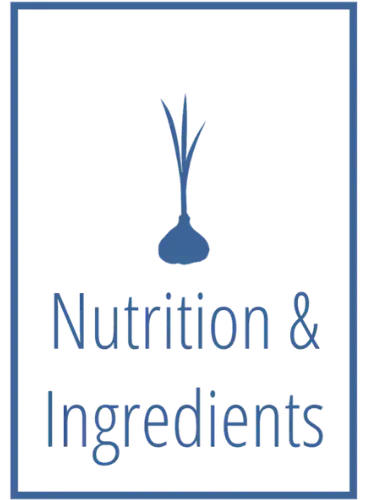McDonald’s Big Mac
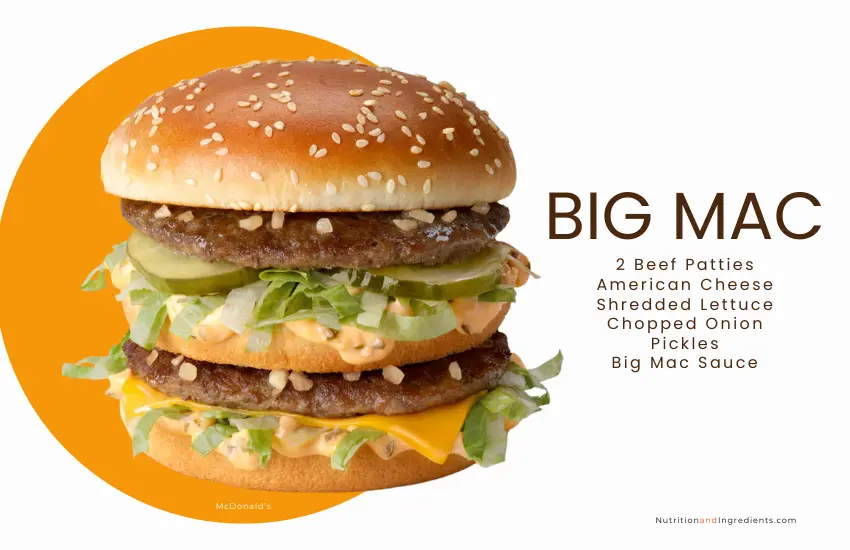
McDonald’s Big Mac is a highly popular double patty cheeseburger made with 100% beef and a slice of American cheese. The burger is topped with lettuce, onions, pickles, and a special sauce, and served on a sesame seed bun.
A Big Mac has 580 calories, 34 grams of fat, 45 grams of carbohydrates, and 25 grams of protein.
Read this fast food nutrition report for a complete analysis of calories and a detailed overview of the nutritional information, ingredients, and allergens in McDonald’s famous cheeseburger.
Big Mac Nutrition Information
Nutrition facts are based on standard formulations for one cheeseburger.
Calories
There are 580 calories in a McDonald’s Big Mac cheeseburger.
Here is a summary of calories by macronutrient, per serving.
Dietary fats contribute over half of the total calories. Carbohydrates make up another 31% of the total calories and the remaining 17% is from protein.
Big Mac
% calories from fat, carbs and proteinCalories by macronutrient are rounded estimates based on the nutrition facts information provided by McDonald’s. Calories may vary as a result of how the burger is prepared or due to topping choices.
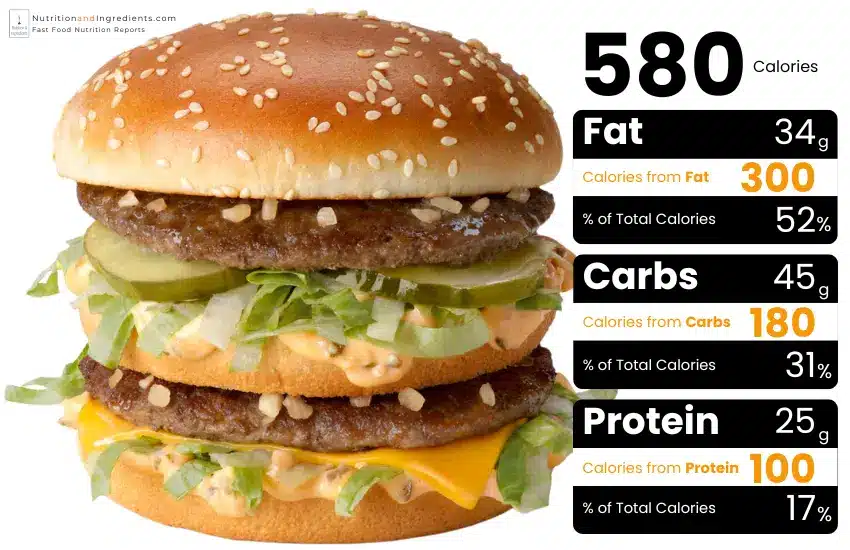
Time to Burn Calories
An average adult would need to run at a moderate pace for approximately 50 minutes to burn off the calories from a Big Mac.
Here is a list of approximate times required to burn 580 calories, by type of exercise.
ESTIMATED FITNESS TIME TO BURN 580 CALORIES
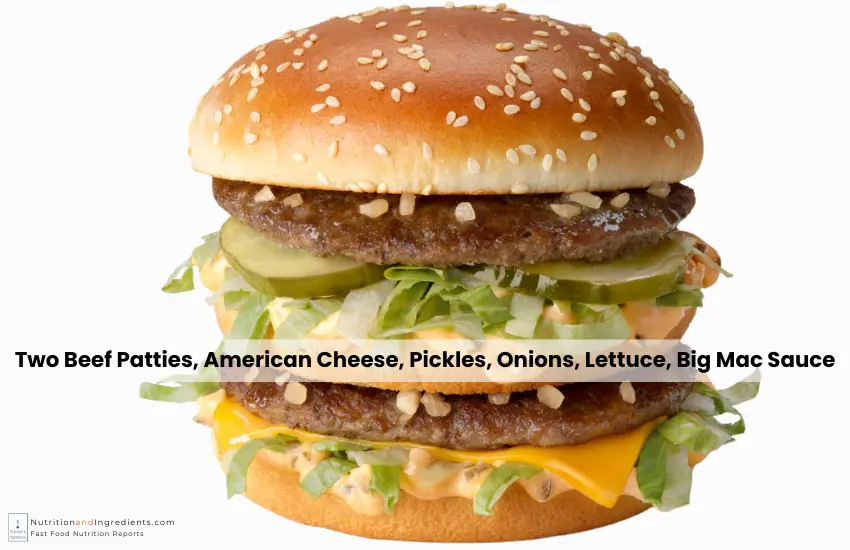
Check nutrition facts in McDonald’s burger menu.
Remove the bun for a lower calorie option. A Big Mac without the bun has 390 calories (190 fewer than the standard cheeseburger).
Nutrition Facts
Review the table below for nutrition facts in McDonald’s double patty cheeseburger.
Amount (%DV) per Big Mac
Red indicates a high %DV.
|
Calories |
580 |
%DV |
|
Total Fat |
34g |
43% |
|
Saturated Fat |
11g |
56% |
|
Trans Fat |
1g | |
|
Cholesterol |
85mg |
28% |
|
Sodium |
1060mg |
46% |
|
Carbohydrates |
45g |
16% |
|
Dietary Fiber |
3g |
10% |
|
Total Sugars |
7g | |
|
Added Sugars |
5g |
10% |
|
Protein |
25g |
%DV based on a 2,000 calorie diet. Calorie needs vary and your %DV may be higher or lower. Provided for informational purposes only. Consult with your physician for dietary or healthcare advice.
Daily Value
Daily Value (%DV) measures the amount of a nutrient per serving, relative to the recommended limit. Use %DV to compare and select foods for a balanced diet.
As shown in the chart below, a Big Mac is high in saturated fat and sodium.
|
%DV |
Level | |
|
Total Fat |
43% |
HIGH |
|
Sodium |
46% |
HIGH |
%DV based on 2,000 calorie diet. FDA suggests a %DV of 5% or less is low and 20% or more is high.
Dietary Fats
Each serving of the Big Mac has 34 grams of total fat, including 11 grams of saturated fat.
The amount of saturated fat has a 56% daily value (%DV), which is considered high.
Calculate Daily Value
To calculate %DV, divide the amount of a nutrient in one serving by the FDA-recommended daily limit.
|
per Burger |
Daily Limit* |
Daily Value | |
|
Total Fat |
34g |
78g |
43% |
|
Saturated Fat |
11g |
20g |
56% |
*Based on FDA general nutrition advice for an adult following 2,000 calorie daily diet.
There are 100 calories from saturated fat, about 17% of the total 580 calories per serving.
Summary of Fat in a Big Mac
Sodium
McDonald’s Big Mac contains 1,060 milligrams of sodium, which is nearly half the recommended limit of 2,300 milligrams for an entire day (based on 2,000 calories).
Dietary Cholesterol
Dietary cholesterol is also high. There are 85 milligrams of cholesterol per serving. That equates to 28% of the daily limit.

Review Nutrition Reports
Check the amount of sodium and saturated fat to determine if fast food burgers are a good fit for your diet plan.
Big Mac Ingredients and Allergens
What’s on McDonald’s Big Mac?
McDonald’s famous Big Mac is made with two beef patties seasoned with salt and pepper. The sandwich includes melting American cheese, shredded lettuce, chopped onions, pickles, and a special Big Mac sauce.
Big Macs are served on a sesame seed bun.
According to McDonald’s, the cheeseburger is made without artificial flavors or colors. However, the pickle contains an artificial preservative.
The section that follows include the list of ingredients in McDonald’s Big Mac, which (in addition to below) includes lettuce and onions.
Ingredients
|
Beef Patty |
|
100% Pure USDA inspected Beef prepared with Salt and Black Pepper |
|
Bun |
|
Enriched Flour, Water, Sugar, Yeast, Soybean Oil, Sesame Seeds, Potato Starch, Salt, Dextrose, Corn Starch, Modified Food Starch, Vinegar, Vegetable Proteins (pea, potato, rice, and/or faba bean), Sunflower and/or Canola Oil, Maltodextrin, Wheat Gluten, Natural Flavors, Dough Conditioners |
|
Big Mac Sauce |
|
Soybean Oil, Sweet Relish, Water, Egg Yolks, Distilled Vinegar, Spices, Onion Powder, Salt, Propylene Glycol Alginate, Garlic Powder, Vegetable Protein, Sugar, Caramel Color, Turmeric, Extractives of Paprika, Soy Lecithin |
|
Pasteurized Process American Cheese |
|
Milk, Cream, Water, Sodium Citrate, Salt, Cheese Cultures, Citric Acid, Enzymes, Soy Lecithin, Color Added |
|
Pickles |
|
Cucumbers, Water, Distilled Vinegar, Salt, Calcium Chloride, Alum, Potassium Sorbate, Natural Flavors, Polysorbate 80, Extractives of Turmeric (color) |
|
Vegetables |
|
Lettuce, Onions |
Allergens
The hamburger is made with ingredients that contain egg, sesame, soy, and wheat.
Check list of declared allergens in McDonald’s burgers.
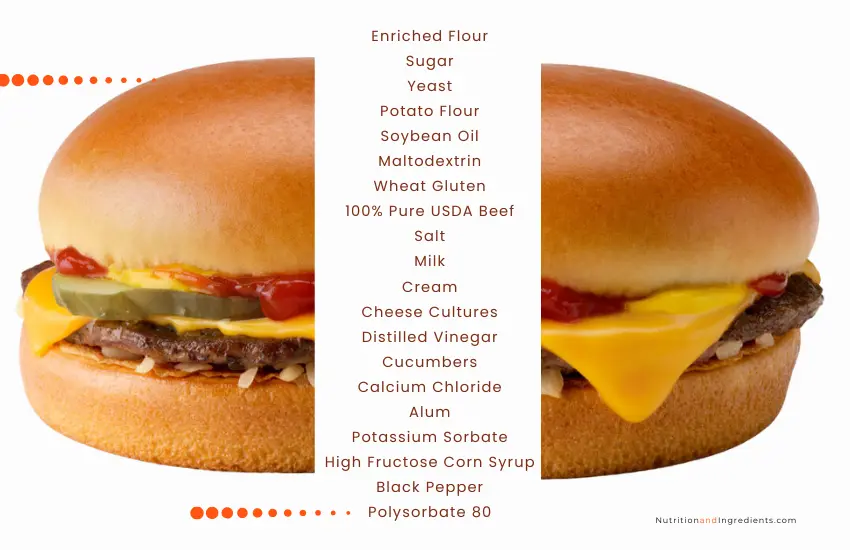
Nutrition facts, prices, and ingredients are based on available information as of the date of publication. Restaurants and food manufacturers may change recipes or formulations without notice. Check package labels and ask the product manufacturer or restaurant for the most up-to-date information. Unless otherwise stated, %DV is based on a 2,000 calorie diet. All reports and reviews published on this site are for informational purposes only. NutritionandIngredients.com does not provide healthcare advice or dietary recommendations. Always consult your licensed physician for any healthcare or dietary advice.
Nutrition facts, ingredients, burger product image source: McDonald’s. Original designs by Nutrition & Ingredients for research and commentary related to fast food nutrition.
